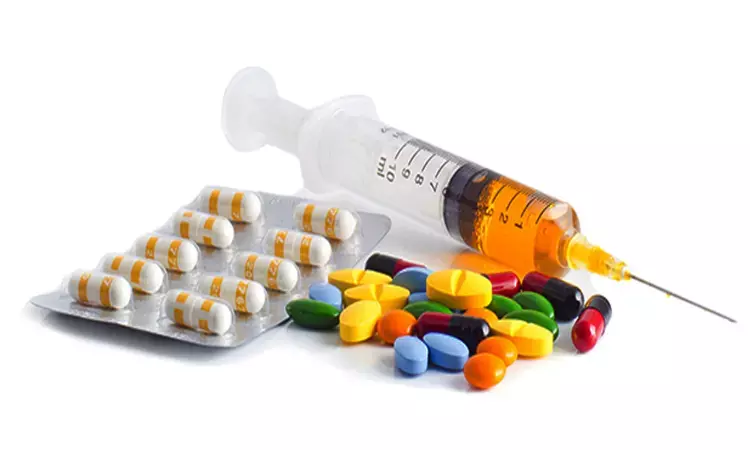- Home
- Medical news & Guidelines
- Anesthesiology
- Cardiology and CTVS
- Critical Care
- Dentistry
- Dermatology
- Diabetes and Endocrinology
- ENT
- Gastroenterology
- Medicine
- Nephrology
- Neurology
- Obstretics-Gynaecology
- Oncology
- Ophthalmology
- Orthopaedics
- Pediatrics-Neonatology
- Psychiatry
- Pulmonology
- Radiology
- Surgery
- Urology
- Laboratory Medicine
- Diet
- Nursing
- Paramedical
- Physiotherapy
- Health news
- Fact Check
- Bone Health Fact Check
- Brain Health Fact Check
- Cancer Related Fact Check
- Child Care Fact Check
- Dental and oral health fact check
- Diabetes and metabolic health fact check
- Diet and Nutrition Fact Check
- Eye and ENT Care Fact Check
- Fitness fact check
- Gut health fact check
- Heart health fact check
- Kidney health fact check
- Medical education fact check
- Men's health fact check
- Respiratory fact check
- Skin and hair care fact check
- Vaccine and Immunization fact check
- Women's health fact check
- AYUSH
- State News
- Andaman and Nicobar Islands
- Andhra Pradesh
- Arunachal Pradesh
- Assam
- Bihar
- Chandigarh
- Chattisgarh
- Dadra and Nagar Haveli
- Daman and Diu
- Delhi
- Goa
- Gujarat
- Haryana
- Himachal Pradesh
- Jammu & Kashmir
- Jharkhand
- Karnataka
- Kerala
- Ladakh
- Lakshadweep
- Madhya Pradesh
- Maharashtra
- Manipur
- Meghalaya
- Mizoram
- Nagaland
- Odisha
- Puducherry
- Punjab
- Rajasthan
- Sikkim
- Tamil Nadu
- Telangana
- Tripura
- Uttar Pradesh
- Uttrakhand
- West Bengal
- Medical Education
- Industry
Even low doses of steroids increase risk of cardiovascular disease, finds study

A study published in PLOS Medicine by Mar Pujades-Rodriguez at Leeds University and colleagues suggests that even low doses of glucocorticoid may increase the risk of cardiovascular diseases.Medication used to treat a range of inflammatory diseases may be less safe than previously thought.
Glucocorticoids are steroids widely prescribed to treat a range of immune-mediated inflammatory diseases. While high doses of steroids are known to increase the risk of cardiovascular disease, the impact of lower doses is unknown.
To quantify glucocorticoid dose-dependent cardiovascular risk, researchers analyzed medical records of 87,794 patients diagnosed with 6 different immune-mediated inflammatory diseases receiving care from 389 United Kingdom primary care clinics in 1998-2017. The researchers found that for patients using less than 5 miligrams prenisolone per day, the absolute risk of cardiovascular disease nearly doubled compared to patients not using glucocorticoids (Hazard Ratio = 1.74; 95% confidence interval 1.64–1.84). Increased dose-dependent risk ratios were found across all CVDs measured, including atrial figrillation, heart failure, acute myocardial infarction, peripheral arterial disease, cerebrovascular disease, and abdominal aortic aneurysm.
Previously, it was believed that taking 5 mg of glucocorticoid over the long-term was safe, but the study suggests that even patients taking low doses have double the risk of developing cardiovascular disease. These findings suggest patients needing long-term steroid treatment should be prescribed the lowest effective dose and have a personalized cardiovascular risk prevention plan that accounts for past and current steroid use. Although the study was limited by the lack of available hospital data on prescription drug adherence and may have reduced the size of dose-response estimates, the authors believe that the large sample size contributes to greater generalizability of the results.
According to the authors, "Our findings highlight the importance of implementing and evaluating targeted intensive cardiovascular risk factor modification interventions; promptly and regularly monitor patient cardiovascular risk, beyond diagnosis of inflammatory arthropathies and systemic lupus erythematosus, even when prescribing low prednisolone-equivalent doses".
Citation: Pujades-Rodriguez M, Morgan AW, Cubbon RM, Wu J (2020) Dose-dependent oral glucocorticoid cardiovascular risks in people with immune-mediated inflammatory diseases: A population-based cohort study. PLoS Med 17(12): e1003432. https://doi.org/10.1371/journal.pmed.1003432
Dr Kamal Kant Kohli-MBBS, DTCD- a chest specialist with more than 30 years of practice and a flair for writing clinical articles, Dr Kamal Kant Kohli joined Medical Dialogues as a Chief Editor of Medical News. Besides writing articles, as an editor, he proofreads and verifies all the medical content published on Medical Dialogues including those coming from journals, studies,medical conferences,guidelines etc. Email: drkohli@medicaldialogues.in. Contact no. 011-43720751


